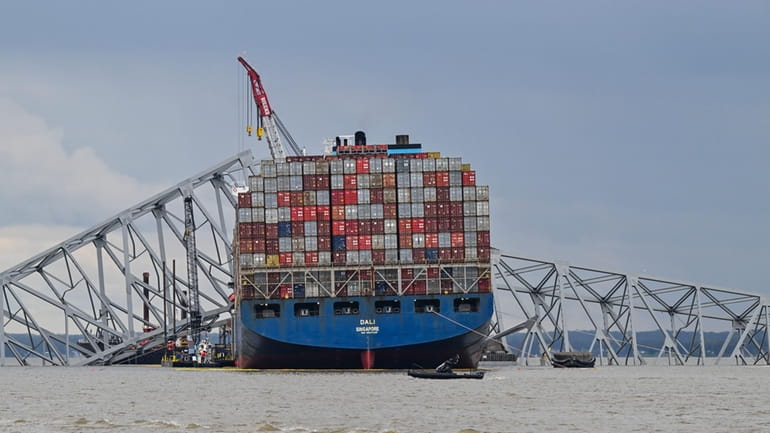House Republicans can't even do the right thing during a disaster

Workers dismantle the collapsed Francis Scott Key Bridge in Baltimore. Credit: The Washington Post/Ricky Carioti
It’s as if Republican lawmakers can’t help themselves when it comes to anything requiring bipartisanship — even in the face of disaster. How else to explain their churlish response to the tragic collapse of the Francis Scott Key Bridge in Baltimore?
The incident itself was shocking enough — a towering cargo ship nearly 1,000 feet long and weighing more than 100,000 tons with freight lost power in the middle of the night and crashed into a critical support pylon. Within seconds, the 1.6 mile span fell into the water and six construction workers who were making overnight repairs on the bridge died.
Later that day, President Joe Biden assured the state and public that the federal government would cover the cost of rebuilding the vital transportation link, the loss of which has crippled the Port of Baltimore and could have serious repercussions for the nation’s economy. Incredibly, the president’s pledge triggered some House Republicans, who wasted little time posting their objections on social media. Pennsylvania Representative Dan Meuser labeled the promise “outrageous.” Representative Jeff Duncan of South Carolina figured this might be a good time to make federal aid conditional, saying the money should come from the Infrastructure Investment and Jobs Act Biden signed in 2021, adding “before we spend one more dime for domestic infrastructure, we must build (wait for it) a… border wall.”
This unfortunately has become the new normal in this Congress. But it wasn’t always this way and it doesn’t have to be.
This column does not necessarily reflect the opinion of the editorial board or Bloomberg LP and its owners. Patricia Lopez is a Bloomberg Opinion columnist covering politics and policy. She is a former member of the editorial board at the Minneapolis Star Tribune, where she also worked as a senior political editor and reporter.
The most comparable situation to the Key bridge came on Aug. 1, 2007, in Minneapolis. It was a scorching hot summer evening when the eight-lane I-35W bridge over the Mississippi River—loaded with rush hour traffic — collapsed without warning. Thirteen people were killed and 145 were injured. More than 100 vehicles fell with the bridge and about half of those plummeted into the river below.
The response to that catastrophe is worth examining.
It took Congress just three days to authorize $250 million in federal funds for repairs to the bridge. President George W. Bush promptly signed the bill. That quick action proved critical in allowing state and local officials, still wrestling with recovery and cleanup, to start plans for the rebuild, knowing funding was secured.
At the time, Democratic Minnesota Senator Amy Klobuchar said that she and fellow Minnesota Senator Norm Coleman, a Republican, “were able to impress upon our colleagues the importance and urgency of this funding,” for what she called “the most heavily traveled bridge in our state.” The Twin Cities Daily Planet reported that Coleman agreed, saying in a statement that “We are going to rebuild this bridge as a community and we are going to rebuild it quickly.”
The bridge was rebuilt and ready to roll within 13 months —three months ahead of schedule.
The federal government’s deep pockets have typically been part of the standard response to massive disasters such as Baltimore’s. When a train derailed in East Palestine, Ohio in 2023, Washington covered upfront costs. Ditto for the Deepwater Horizon oil spill in the Gulf of Mexico off the Louisiana coast in 2010.
It’s important to note that Biden hasn’t ruled out recouping the costs from the company that owns the container ship or its insurer. That too is standard. But the Singaporean company that owns the ship has already moved to limit its liability and is likely to postpone any potential payout as long as possible.
Jim Tymon, executive director of the American Association of State Highway and Transportation Officials, recently cited the handling of the Minneapolis bridge collapse as an example of how to handle such incidents. "It's the best comparison that we have for a project like this," he said. "They did outstanding work in being able to get the approvals necessary to be able to rebuild that as quickly as possible."
So what’s changed?
“What seems to have changed to me is the standard of decency,” Klobuchar said. Whether Democrat or Republican, she said, “we all joined hands and worked together as a team. I’m still hopeful that people will rise to the occasion this time as well.”
Thankfully, outgoing Senate Minority Leader Mitch McConnell has come out in support of Biden’s pledge, saying it’s the government’s responsibility to cover the costs. “In situations like that,” he told a radio host in an interview, “whether it’s a hurricane in Florida or an accident like this, the federal government will step up and do the lion’s share of it.”
The objections by Republican lawmakers can be construed as just the latest from a group of loud-mouthed attention-grabbers who’ve found a new target. It could also be more: an attempt to define the terms of the coming debate, to demonstrate that even when disaster strikes, it’s still just just another bargaining chit, a zero sum game in which nothing is given unless something is gained.
This column does not necessarily reflect the opinion of the editorial board or Bloomberg LP and its owners. Patricia Lopez is a Bloomberg Opinion columnist covering politics and policy. She is a former member of the editorial board at the Minneapolis Star Tribune, where she also worked as a senior political editor and reporter.
